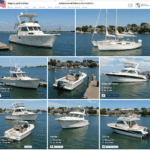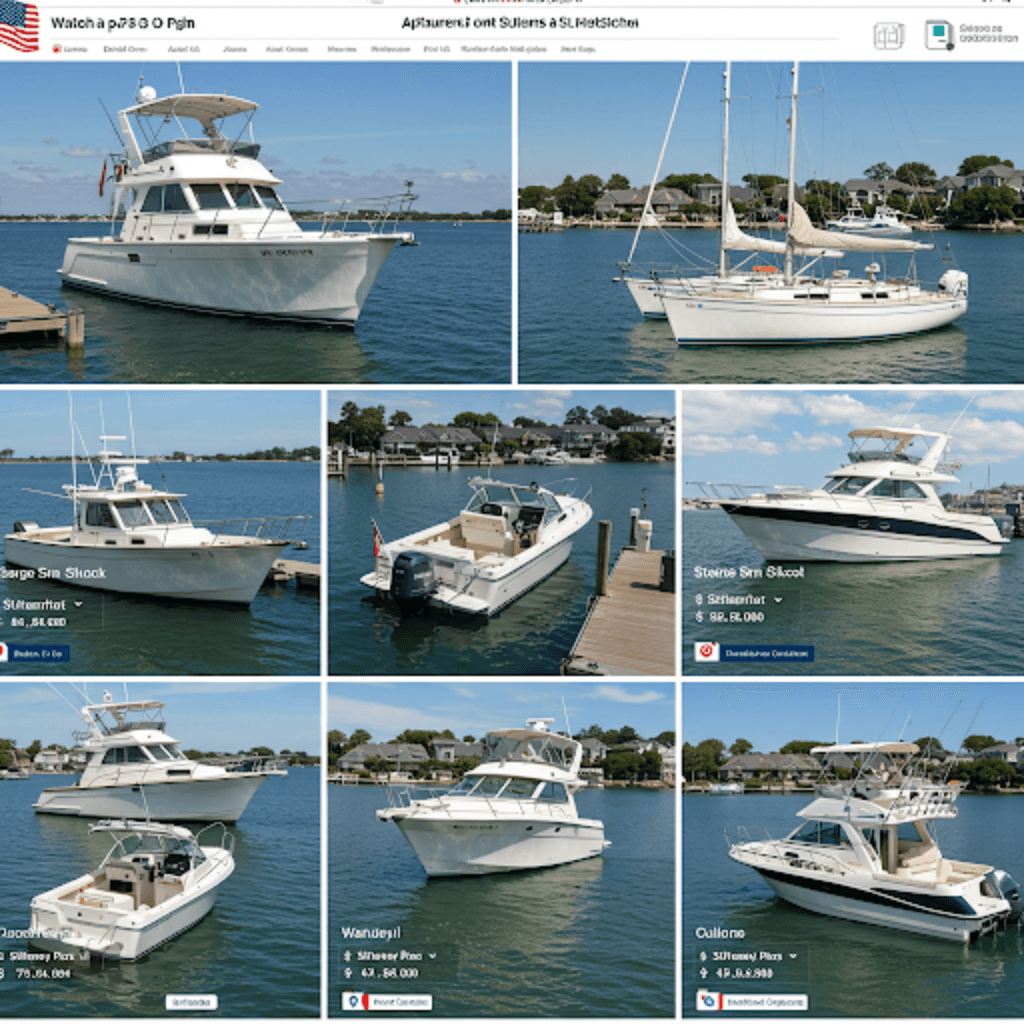
Navigating the waters: Your comprehensive guide to buying a boat in the USA
The allure of the open water, the thrill of the catch, the serenity of a sunset cruise – owning a boat unlocks a world of possibilities. But the journey to boat ownership can feel as vast and unpredictable as the ocean itself. This comprehensive guide is designed to help you navigate the process, providing you with the knowledge and confidence to find the perfect vessel to match your dreams and budget.
Defining your boating needs and budget
Before you even start browsing listings, take a step back and consider your boating aspirations. What kind of activities do you envision? Are you looking for leisurely fishing trips, exhilarating watersports, extended cruising adventures, or simply relaxing days on the lake? Different boats are designed for different purposes, and choosing the right type is crucial.
Consider these questions:
- What will you primarily use the boat for? (Fishing, waterskiing, cruising, day trips, overnight stays)
- How many people do you typically expect to have on board?
- Where will you be boating? (Lakes, rivers, coastal waters, open ocean)
- What is your budget? (Include not only the purchase price but also ongoing costs like insurance, storage, maintenance, and fuel.)
- Do you have experience handling a boat? If not, consider taking a boating safety course.
Once you’ve answered these questions, you can start to narrow down your options. A realistic budget is also essential. Remember that the purchase price is just the beginning. Factor in ongoing costs like insurance, registration, storage (dockage or trailer storage), maintenance, repairs, fuel, and accessories. It’s often recommended to allocate a portion of your budget specifically for unexpected repairs.
Types of boats: Finding your perfect match
The world of boats is incredibly diverse. Here’s a breakdown of some of the most popular types:

- Fishing boats: These come in various forms, from small aluminum jon boats to large, offshore center consoles. Features often include livewells, rod holders, fish finders, and ample storage for tackle.
- Pontoon boats: Known for their stability and spacious decks, pontoon boats are ideal for leisurely cruising, entertaining, and family outings. They are generally best suited for calm waters.
- Ski boats/Wakeboard boats: Designed for watersports, these boats feature powerful engines, specialized hulls, and often towers for towing skiers and wakeboarders.
- Bowriders: Versatile and popular, bowriders offer seating in both the bow and cockpit areas, making them suitable for cruising, watersports, and general recreation.
- Deck boats: Similar to bowriders but with a wider hull, deck boats provide even more space and stability, often accommodating larger groups.
- Sailboats: Powered by the wind, sailboats offer a unique and rewarding boating experience. They range from small day sailers to large cruising yachts.
- Cruisers (Cabin Cruisers): These boats feature enclosed cabins with sleeping accommodations, galleys (kitchens), and heads (bathrooms), making them suitable for overnight trips and extended cruising.
- Yachts: Generally larger and more luxurious than cruisers, yachts offer the ultimate in comfort and amenities for extended voyages.
- Bass boats: Specifically designed for bass fishing, these boats are typically low-profile, fast, and equipped with features like trolling motors, livewells, and sophisticated electronics.
- Personal Watercraft (PWCs): Commonly known as Jet Skis, PWCs are small, agile craft designed for one to three riders, offering thrilling rides and easy maneuverability.
New vs. Used: Weighing the pros and cons
The decision between buying a new or used boat is a significant one. Each option has its advantages and disadvantages.
New boats:
- Pros: Warranty coverage, latest technology and features, customization options, peace of mind knowing the boat’s history.
- Cons: Higher purchase price, significant depreciation in the first few years.
Used boats:
- Pros: Lower purchase price, less depreciation, potentially more boat for your budget.
- Cons: Potential for hidden problems, may require more maintenance and repairs, limited or no warranty coverage.
If you’re considering a used boat, a thorough inspection is crucial. It’s highly recommended to hire a qualified marine surveyor to assess the boat’s condition. A surveyor can identify potential problems that might not be apparent to the untrained eye, such as structural issues, engine problems, or electrical malfunctions.
The buying process: From research to closing the deal
Once you’ve determined your needs, budget, and the type of boat you’re looking for, the buying process begins.
- Research: Browse online listings, visit boat shows, and talk to boat owners. Read reviews and compare different models.
- Narrow your choices: Focus on a few specific models that meet your criteria.
- Find a reputable dealer or seller: If buying new, choose a dealer with a good reputation and strong customer service. If buying used, consider working with a broker or researching private sellers carefully.
- Inspect the boat: If buying used, conduct a thorough inspection yourself and hire a marine surveyor. If buying new, carefully review the boat’s features and specifications.
- Sea trial: Take the boat for a test drive to assess its performance, handling, and overall feel.
- Negotiate the price: Be prepared to negotiate, especially on used boats. Research comparable sales to determine a fair price.
- Secure financing (if needed): Shop around for the best interest rates and loan terms.
- Complete the paperwork: Work with the dealer or seller to finalize the purchase agreement, title transfer, and registration.
- Arrange for insurance: Obtain boat insurance before taking possession of the boat.
- Arrange for storage: Decide where you will store the boat (dock, trailer, marina).
Essential boating safety and maintenance
Owning a boat comes with responsibilities. Prioritize safety and proper maintenance to ensure enjoyable and trouble-free boating experiences.
- Take a boating safety course: Learn the rules of the road, navigation, and emergency procedures.
- Carry essential safety equipment: Life jackets for all passengers, flares, a first-aid kit, a fire extinguisher, a VHF radio, and navigation tools.
- Check the weather forecast: Before heading out, be aware of the current and predicted weather conditions.
- Follow all boating regulations: Familiarize yourself with local boating laws and regulations.
- Perform regular maintenance: Follow the manufacturer’s recommended maintenance schedule for your engine, hull, and other systems.
- Winterize your boat (if applicable): If you live in an area with freezing temperatures, properly winterize your boat to prevent damage.
Financing and insurance. Important details.
Two critical aspects of boat ownership are securing appropriate financing and obtaining adequate insurance coverage. Financing a boat is similar to financing a car or a home. You’ll likely need to apply for a loan, and the terms will depend on your credit score, the loan amount, and the lender. Shop around for the best interest rates and terms. Consider both secured and unsecured loans. Secured loans use the boat as collateral, which typically results in lower interest rates, but you risk losing the boat if you default on the loan. Boat insurance is essential to protect yourself from financial losses due to accidents, damage, theft, or liability. A typical boat insurance policy may cover:
- Property damage: Damage to your boat from collisions, storms, fire, or vandalism.
- Liability: Injuries or damages you cause to others.
- Medical payments: Medical expenses for you and your passengers if injured in a boating accident.
- Uninsured/underinsured boater: Protection if you’re involved in an accident with a boater who doesn’t have insurance or has insufficient coverage.
- Towing and assistance: Coverage for on-water towing and other assistance if your boat becomes disabled.
The cost of boat insurance varies depending on factors such as the type and value of the boat, your boating experience, your location, and the coverage options you choose. Get quotes from multiple insurance providers to compare rates and coverage.
Enjoy the Journey!
Buying a boat is a significant investment, but it’s also an investment in your lifestyle and well-being. With careful planning, research, and a bit of patience, you can find the perfect boat to create lasting memories on the water. Embrace the journey, and enjoy the countless adventures that await!







